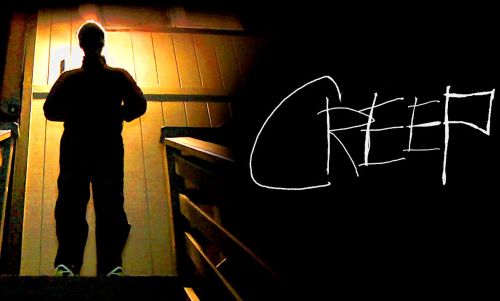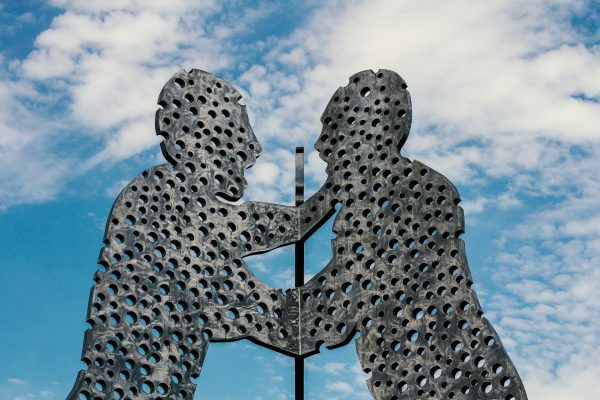Creep (2014) is a horror movie directed by Patrick Brice that can easily be found on Netflix. I know, because I found it on Netflix this morning, and then proceeded to watch it in broad daylight with my mum because I have a long history of freaking myself out when I watch scary movies by myself or in the dark. The basic premise of the film is this: an aspiring videographer (Aaron) answers an ad on Craigslist and ends up working for a man with terminal cancer (Josef) who wants to record a short series of videos about himself for his unborn son. Josef turns out to be, among other things, a compulsive liar with violent tendencies, and weird stuff starts to happen.
It’s actually a really well-made film. I can often be put off by found footage movies. Cloverfield gave me motion sickness and overall, I just find shaky cam kind of annoying and off-putting, but in Creep, it’s seamless and almost natural. After a while, you barely even notice the clunky done-to-death camcorder style videography. And it’s tense as hell. The whole first act ripples with a building sense of unease, as Josef exhibits more and more disturbing behavior and his lies slowly begin to unravel. The second half is less impressive – it defaults to that common horror movie trope of events only being plausible because the protagonist is a stubborn idiot who does things like refuse to call the police until it’s too late, and try to chase the source of spooky noises in the dark while leaving his front door wide open. But it’s still got that slow burn of building tension, and though, as the audience, you have a vague idea of where things are going, you’re never quite sure when or how everything’s going to turn nasty. It was creepy. It more than lives up to its title.
But watching movies as a queer person is never quite as simple as thinking something’s good or bad. Or at least, that’s what I find. I’m constantly disappointed by the lack of representation of lgbtqia+ individuals in modern cinema, and in films like this, my brain immediately goes into critical analysis mode because there’s something really not okay at work here.
‘Queer coding’ is not a new phenomenon in films, especially of the horror genre. The term essentially refers to a character being given traits or mannerisms often associated with queer people but not being explicitly stated as queer. It has its roots in early cinema, where homosexuality was not allowed to be represented on film, but when that ban lifted, the practice evolved to the point where it’s kind of gross and homophobic. Nowadays, it’s often the bad guys who’re coded as queer. Think overly stylish James Bond supervillains, momma’s boy serial killer Norman Bates, even flamboyant Jafar in Disney’s Aladdin. Their traits are exaggerated and inflated to fit with queer stereotypes, and to the average viewer, this creates a subliminal link between evil and queerness. Creep is highly guilty of this. Josef is soft-spoken, physically affectionate, and frequently treats the comparatively manly and heterosexual Aaron like a lover. He carves their initials into a rock, gives him a heart-shaped locket with their pictures in it, and at one point, invites the videographer to film him taking a bath.
The queer coding around Josef’s character is not remotely subtle, but nor is he explicitly gay. Rather, his queer affectations are treated more as evidence of his creepiness, and building proof that he’s dangerous. And that’s really not a good way to deal with lgbtqia+ issues on screen. It is bad enough to appropriate queer-isms, but it is even worse to use them for depictions of villains, thus making queerness seem evil, wrong, and…creepy.






